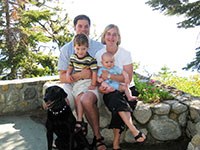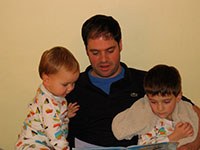Chris Casazza
PEPS award winner helps stay-at-home dads find their footing and their confidence.

- Chris and his wife, Gwyneth, with their sons Peter (left) and Parker in the summer of 2004

By Shawna Gamache
It's hard for most men to make the shift to stay-at-home dad, but Chris Casazza and PEPS are working to make it easier.
Casazza, a licensed counselor and the primary caretaker of two sons, says the biggest hurdle for most new stay-at-home dads isn't the breastmilk schlepping, the numbing sleep deprivation or even changing all those diapers -- it's embracing their new identity.
"There are a lot of messages in our culture that are saying 'You are wrong,'" to be a stay-at-home dad, Casazza said. "We still have deep-seated gender stereotypes that the dad should be the breadwinner."
Casazza wants men to feel proud to be with their children -- whether that's a role they chose or one they fell into.
"I think most dads go into it not thinking they're going to be a stay at home dad," Casazza said. "Most of the time, myself included, it's sort of unexpected."
Casazza teamed up with PEPS last year to create a special group for stay-at-home-dads, tweaking and adding to the PEPS curriculum to better suit the unique needs of stay-at-home-dads. Like talking in more depth about how dads parent differently, discussing how society perceives stay-at-home dads, giving tips for staying active and sane, and adding a new session: “I'm Not Mr. Mom: Finding Your New Identity.”
The first group was full within weeks. Casazza taught three dads daytime groups in Seattle and one on the Eastside.
"I felt the need was out there and I'm just glad that an organization like PEPS was able to recognize that," Casazza said. "I think having a support group will buffer you from some of the negative stereotypes you may experience."
Casazza is a winner of the 2012 Spirit of PEPS award, given to volunteers who provide outstanding service to PEPS.
"Chris was instrumental in getting the PEPS for Dads program off the ground," said PEPS Program Director Mary Power. "We literally could not have made this program happen without Chris."
Casazza said while the dads group touched on many of the same topics most PEPS groups do, the tack for primary caregiver dads is a little different. For example, during the session on mood changes, they focus on how dads typically struggle more with anger, and how to cope with those feelings. During the discussion of sleeping, they talk about feelings of guilt when mom is getting up with baby even though she has to work the next day.
"In general, dads are more reticent to talk about their struggles," Casazza said. "I'm careful to be aware of that and talk more about strengths."
Derek McKee, who attended the first dads' group with his then four-month-old daughter, Piper, said attending the group helped him connect to other area dads and build his confidence. McKee also attended an evening couples group with his wife Jamie, a program officer for the Gates Foundation. But that group only had one other parent staying home.
Casazza did a great job encouraging the men to get together, McKee said. Like creating a Facebook group for group members to use as a discussion board and to organize playdates and events, including a recent parenting lecture held at one dad's house. This summer, Casazza plans to organize a barbecue for all of the program alumni.
McKee said he and dads in his group regularly meet for hikes with their kids at area parks. He said they even organized a few morning playdates at local bars where they could watch NCAA basketball tournament games together while caring for their kids.
McKee said Seattle is in general a very supportive city for stay-at-home dads, but he does sometimes get strange comments or looks, usually from older people.
"Having had these conversations in advance with Chris enabled me to be less surprised, more amused and really able to take them in stride," McKee said. "He was very good at saying that you have to acknowledge that there are differences in the way society will perceive you as being a stay-at-home dad."
Casazza says the worst criticisms a stay-at-home dad hears are often the ones in his own head. A simple trip to the playground can induce a lot of self-doubt as dads in this non-traditional role worry about how others perceive them.
Maybe others will look at him and think there's something wrong, like dad lost his job, or his marriage isn't going well. Dads also worry that approaching a mom might be perceived as an advance.
Stay-at-home dads may also feel self-conscious in their own marriages, struggling to shift their identity away from careers and making money.
Casazza said it's crucial to sit down with your partner early on and talk about how you both feel about dad as primary caretaker. He said he personally spent a year in limbo, having entered the role of primary caretaker because he was finishing up his Master's degree. He didn't know if he really would remain home or if he would start working as a counselor. He said it was a huge relief once he and his wife Gwyneth, actually talked it out and realized both were very happy with the way things were going.
With his own boys now 9 and 11, Casazza is finding his own life in transition again. Casazza recently started a private practice, Seattle Dadvocate, helping support dads in their transition to fatherhood. He says his specialty is working with stay-at-home-dads. He can be reached at seattledadvocate@gmail.com.
Society is changing, Casazza says, citing a recent Pew Research Center report (http://www.pewsocialtrends.org/2013/05/29/breadwinner-moms) that found an increasing number of moms serving as family breadwinner -- and an increasing number of families where mom works out of the home and dad doesn't. But he said our attitudes toward stay-at-home men haven't quite caught up.
"We've had two generations of moms being welcomed back to the workforce but this is the first generation of dads being welcomed to the home," Casazza said. "I think there is a shift among dads to have this be more of a lifestyle rather than something that you have to do by default."
About the Author
 Shawna Gamache is a former newspaper reporter and co-founder of the local blog Moms Alive. She is mama to Ruby (2) and Quinn (3). Her PEPS group still meets every other week.
Shawna Gamache is a former newspaper reporter and co-founder of the local blog Moms Alive. She is mama to Ruby (2) and Quinn (3). Her PEPS group still meets every other week.
Document Actions